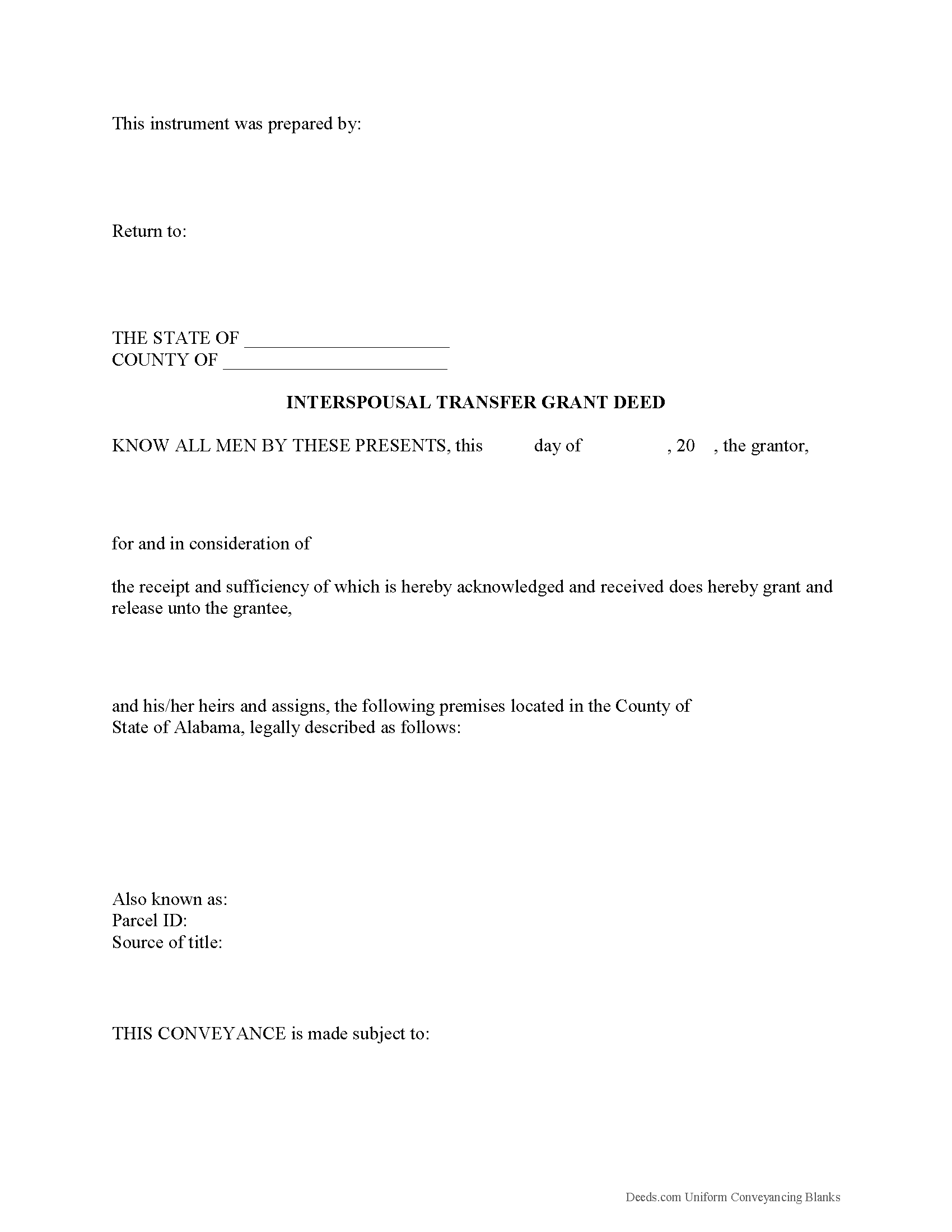Download Alabama Interspousal Transfer Grant Deed Legal Forms

Alabama Interspousal Transfer Grant Deed Overview

An interspousal transfer grant deed is a legal document used by a married couple who owns real property together to voluntarily transfer one spouse's interest in the property to the other [1]. A grant deed guarantees that the grantor (owner) has a present interest in the property, and formalizes the transfer of that interest to the grantee (the recipient). It also guarantees that the property is not encumbered by any undisclosed liens or restrictions, which in turn means that there are no legal claims to the title by third parties. Depending on the circumstance, the transfer of property is either contractual, by gift, or a change in legal title.
This type of deed is most commonly used during a divorce, where one spouse is awarded sole ownership of the property. In some cases, an interspousal transfer grant deed can be filed when a couple would like to refinance their home, and one spouse has poor credit. Sometimes, lenders will ask one spouse to file this type of deed removing him or herself as an owner if the other is borrowing money so that the former cannot claim any of the recovered debt from a foreclosure sale.
No matter the circumstance or the instrument chosen to execute the transfer, the spouse transferring his or her interest in the property waives all legal rights to it. Since the property is no longer jointly owned by the couple, it is imperative that the spouses or former spouses have a trusting relationship. Most of the time, the property is exempt from being refinanced, which can be a perk of making interspousal transfers. But there may be some risk involved, especially if the relationship between the spouses is strained. For example, during a divorce, if one spouse transfers his or her interest in the property to the other, and the property is exempt from refinancing, the spouse who no longer holds interest in the property may still be held liable for mortgage payments because the spouse was a co-signer of the loan [2]. The spouse who no longer holds interest can be held accountable by a judge for paying fifty percent of the mortgage for a property he or she no longer owns.
A lawful interspousal transfer grant deed includes the grantor's full name and marital status, as well as the grantee's full name, marital status, mailing address, and vesting. Vesting describes how the grantee holds title to the property. For Alabama residential property, the primary methods for holding title in co-ownership are tenancy in common and joint tenancy. The right of survivorship is not presumed in Alabama, and must be specified in the form of the deed (Ala. Code 1975, 35-4-7).
As with any conveyance of real estate, an interspousal transfer grant deed requires a complete legal description of the parcel. In Alabama, if the legal description references a plat, the plat should be attached to the deed, or the deed should describe the plat book and office in which it can be found (35-4-74). Recite the source of title to establish a clear chain of title, and detail any restrictions associated with the property.
Guarantees and responsibilities must be stated in the deed as well. These guarantees indicate that the grantor owns the property free and clear of encumbrances, and the seller assumes the responsibility for settling any future claims. If there is a time limit on the guarantees, it must also be incorporated in the deed. The finished copy of the deed must be duly signed by the parties and notarized according to law.
All transfers of real property in Alabama are subject to a transfer tax. Instruments will not be accepted for recording until the tax is paid (40-22-1.). A Real Estate Sales Validation Form (Form RT-1) must be signed by the grantor, grantee, owner or agent, and requires the total purchase price, the actual value, or the assessor's market value of the property (40-22-1.). In the case of a non-resident transfer, include a Non-Resident Withholding Form under (40-18-86.).
Record the original completed deed, along with any additional materials, in the recording division of the probate office of the county where the property is located. Include all relevant documents, affidavits, forms, and fees with the along with the deed for recording. Contact the same office to verify which additional materials are necessary, as well as the accepted forms of payment.
In some cases, there is no exchange of consideration when the property is transferred using an interspousal transfer grant deed. The federal government may identify such transfers as gifts, and which are potentially subject to the federal gift tax. The transfer of property from a spouse or former spouse isn't subject to gift tax if it meets any of the following exceptions: It is made in settlement of marital support rights, it qualifies for the marital deduction, it is made under a divorce decree, or it is made under a written agreement, and the couple is divorced within a specified period. If the transfer of property doesn't qualify for an exemption, or only qualifies in part, report that the transfer is subject to gift tax on IRS Form 709 [2], [3].
This article is provided for informational purposes only and is not a substitute for the advice of an attorney. Contact a lawyer with any questions about interspousal transfer grant deeds or other issues related to the transfer of real property. For questions regarding federal and state taxation laws, consult a tax specialist.
[1] https://www.boe.ca.gov/proptaxes/pdf/ah401.pdf
[2] http://thelawdictionary.org/article/quitclaim-deed-impact-ownership-mortgage-and-bankruptcy/
[3] https://taxmap.ntis.gov/taxmap/pubs/p504-005.htm#en_us_publink1000176059
(Alabama Interspousal Transfer Grant Deed Package includes form, guidelines, and completed example)